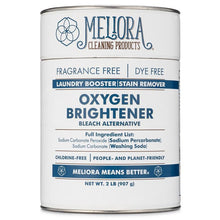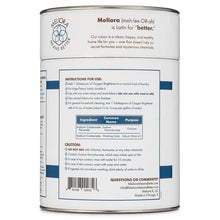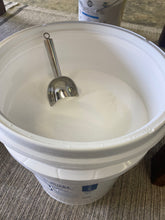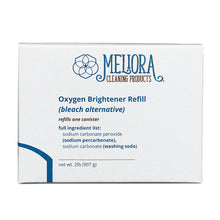Description / Give your laundry a boost with this people- and planet-friendly bleach alternative Oxygen Brightener. Our color-safe laundry boosting oxygen brightener works great as an addition to your laundry routine, or anywhere in your home you need a little extra kick. Try it on your favorite coffee and tea mugs to cut through any buildup!
Alternative to / Bleach has long been considered a household staple for laundry, cleaning, and disinfecting. While bleach is certainly versatile, it’s also a strong irritant that’s toxic for people and the planet and extremely dangerous when mixed with other chemicals. You and your home deserve better.
Size / Net Weight 2 lb
✓ 100% Plastic-Free
✓ Dye-Free
✓ Preservative-Free
✓ Palm-Oil Free
✓ Fragrance Free
✓ Cruelty-Free, Vegan
✓ Chlorine Free
✓ MADE SAFE Certified
✓ 1% of every sale goes towards environmental causes
Packaging / 100% plastic free
Use /
- Add 1 Tablespoon to a normal load of laundry
- For large/heavy loads, double it.
- Use with any water temp (for best results, warmer is better) and most fabrics (do not use with wool or silk)
- Test colored fabrics for color-fastness
For general household cleaning, mix 1 Tablespoon of Oxygen Brightener with 8-16 oz. of warm water (about 1/4- to 1/2-cup of Oxygen Brightener per gallon of water)
End of Life / Recycle or/and compost packaging
Full Ingredient List / Full Ingredient List: Sodium Carbonate Peroxide (Sodium Percarbonate), Sodium Carbonate (Washing Soda)
More Detailed Information On Ingredients:
- Sodium Carbonate Peroxide: More commonly called Sodium Percarbonate. A people- and planet-friendly oxidizer, sodium percarbonate breaks down organic dirts and stains to make them easier to remove from your clothes and home. Upon completion of the reaction, all that remains of sodium percarbonate is water and oxygen.
- Sodium Carbonate: Also known as washing soda or soda ash, sodium carbonate is a pH adjuster. It raises the pH of the washing water, which results in more effective cleaning. For this reason it's often referred to as a laundry 'booster'.
How to use Oxygen Brightener safely
Oxygen Brightener is a safer alternative to chlorine bleach. Its cleaning power comes from sodium percarbonate, an oxidizing agent that breaks down organic compounds. It’s a more people and planet-friendly bleach alternative that cleans, whitens, deodorizes, and removes stains from fabrics and surfaces.
While sodium percarbonate is safer for your family and the environment than chlorine bleach, it is still a powerful chemical that should be used properly. However you use Oxygen Brightener, be sure to follow these safety guidelines:
- Do not mix Oxygen Brightener with other chemicals such as chlorine or ammonia. While sodium percarbonate is generally not as dangerous as bleach or ammonia, it’s always safest to avoid mixing chemicals and products that are not designed to work together. Oxygen Brightener is safe to use with our other products, like Laundry Powder and Soap Stick — in fact, we recommend it!
- Do not store Oxygen Brightener and water solutions in sealed containers. The reaction between sodium percarbonate and water releases gas, which creates pressure in sealed containers.
- We do not recommend using Oxygen Brightener with septic systems. While your system may be able to handle a small amount of Oxygen Brightener, we recommend consulting a septic system professional before use. Oxygen Brightener is gentler on septic systems than chlorine bleach, sodium percarbonate is an oxidizing agent that kills the bacteria that are necessary for septic systems to work properly.
- Avoid contact with eyes and skin and do not ingest. In case of eye contact, rinse your eyes with water for 15 minutes. In case of skin contact, wash the affected area with soap and water. If ingested, drink plenty of water to dilute, and do not induce vomiting.
How to use Oxygen Brightener as a laundry booster
Oxygen Brightener is an easy and effective laundry booster. The combination of sodium percarbonate and washing soda softens hard water, helps detergents penetrate deeper into fabrics, and breaks down organic compounds.
For best results, follow these steps:
- Only use Oxygen Brightener as directed on compatible fabrics
- Use the right amount of powder for your machine and load
- Place powder directly in the washing machine drum before adding clothes
- Use the right temperature setting for your machine and season
We’ll walk through each of these steps in more detail.
Only use Oxygen Brightener as directed on compatible fabrics
Oxygen Brightener is safe for many fabrics, including lights, darks, colors, cotton, synthetics, and more. It is a color-safe bleach alternative that’s effective at brightening clothes and removing stains. However, it should not be used to clean wool, silk, and other fabrics made from delicate natural fibers.
Oxygen Brightener is safe for use on these fabrics*:
- Lights, darks, and colors
- Cotton and linen, including denim, flannel, corduroy, canvas, twill, and more
- Synthetics, including polyester, fleece, rayon, acrylic, nylon, and more
- Sports gear, such as gym clothes, baseball caps, helmets, shin guards, and more
*Always defer to the care instructions on the product tag. We recommend testing any new or delicate fabrics and surfaces in an inconspicuous area before cleaning fully.
Oxygen Brightener should not be used on these fabrics:
- Wool, including cashmere, merino, lambswool, mohair, and more
- Silk
Oxygen Brightener is effective at removing stains, including:
- Food stains, including red wine, tomato sauce, juice, coffee, chocolate, and more
- Dirt and grass
- Oil and grease
- Baby messes
- Blood
- Sweat stains
Use it to soften hard water, break down tough stains, remove odors like sweat and smoke, and brighten faded whites. It’s especially useful for fabrics where dirt and odors build up over time, like workout clothes, bath towels, and rags.
How much Oxygen Brightener to use per load
How much Oxygen Brightener you should use depends on your washing machine and the size and soil level of the load you’re washing. Start with 1/2 tablespoon if you have a high-efficiency (HE) washer or 1 tablespoon if you have a standard (non-HE) machine. This is based on a typical washing machine size of approximately 3.1–4 cubic feet and a load size of about 12–16 pounds.
Most newer machines are high-efficiency, meaning they are designed to use less water and energy. If your washer has an “HE” logo on it, then it’s a high-efficiency machine. Otherwise, you can find out if you have an HE washer by checking the user manual or searching for it online using the model number.
You can adjust the amount of powder used based on the size of the load. For very small loads, use a bit less. For very large loads, add a bit more. The goal is to get enough powder to effectively clean your clothes while completely dissolving in the wash.
The same goes for the soil level of the load. If your clothes are very dirty or stained, such as from gardening, exercising, or cooking, you can add a bit more powder. If they just need a light clean, you can use less powder.
Where to put Oxygen Brightener in the washing machine
In both front-loading and top-loading washing machines, add the powder directly to the drum before adding clothes. This prevents powder from getting caught in your clothes during the wash and ensures that water can easily reach and dissolve the powder.
For best results, do not add the powder to the dispenser drawer. Machines that are designed for liquid detergents and boosters may not flush the drawer with enough water to dissolve and wash out powders. Undissolved powder can build up in your machine and cause unwanted odors and dinginess.
What temperature water to use for laundry with Oxygen Brightener
Oxygen Brightener is designed to work in the same water temperatures as laundry detergent. In modern washing machines, the ‘cold’ setting mixes hot and cold water to reach 60 degrees F, the minimum temperature required for laundry detergents. That means in most cases you can use the cold cycle to save energy and money while washing your clothes.
However, there are some exceptions:
Cold weather laundry
‘Tap cold’ uses water straight from the pipes in your home without adjusting the temperature. For best results, we recommend using ‘cold’ instead of ‘tap cold’ if your machine has both options.
During the cold winter months, the ‘tap cold’ water temperature can dip below 60 degrees. When doing laundry in freezing weather, you might want to use ‘semi-warm’ or ‘warm’ to ensure that the water gets to the right temperature fast enough.
Sanitizing
Cold water works great for regular washing, but hot water is recommended for sanitizing. According to the CDC, “you probably do not need to sanitize or disinfect unless someone in your home is sick or someone sick has recently visited.” Since hot water uses more energy and can be hard on your clothes, we recommend saving it for when someone is sick.
Care instructions
Certain fabrics may require specific water temperatures. While cold water is best for delicate, dark, and colorful fabrics, some items may benefit from warmer water temperatures. For best results, always defer to the care instructions on the product tag.
Our Oxygen Brightener is color-safe, so you can use it on lights, darks, and colors. It is not safe for delicate natural fibers, including wool and silk.
How to use Oxygen Brightener as an oxygen cleaner
Oxygen Brightener is a powerful stain remover, deodorizer, and general-purpose cleaner with many uses around the house. It excels at removing organic matter like dirt, sweat, oil, grease, and coffee. For best results, follow these steps:
- Only use Oxygen Brightener as directed on compatible surfaces
- Create a liquid solution by mixing Oxygen Brightener with warm water
- Use the solution to clean surfaces and soak objects
- Wash and rinse surfaces and objects thoroughly after cleaning
We’ll walk through each of these steps in more detail.
Only use Oxygen Brightener as directed on compatible surfaces
Oxygen Brightener is a versatile cleaner that can be used to clean dishes, mugs, thermoses, cookware, trash cans, tubs, tiles, grout, and more. It should not be used on delicate or natural materials, such as jewelry, wood, or painted surfaces.
Oxygen Brightener is safe for use on these surfaces:
- Glass and ceramic dishes, mugs, plates, and cookware
- Coffee pots, kettles, and thermoses
- Grout
- Trash cans
Oxygen Brightener should not be used on these surfaces:
- Jewelry
- Latex paint
- Natural materials such as wicker, jute, teak
- Wood
- Septic tanks and drains that feed into them
Create a liquid solution of Oxygen Brightener and water
How much Oxygen Brightener and water you mix together depends on what you want to clean and how strong of a cleaner you want to make. Start with 1 tablespoon of powder for each 16 ounces of warm water. For a bigger batch, that’s about 1/2 cup of powder for each gallon of water.

This makes a liquid solution that’s effective for general cleaning. For very soiled items or extra tough stains, you can make a stronger solution by adding more powder. You can even make a heavy-duty cleaning paste by mixing equal parts of Oxygen Brightener and water, such as 1 tablespoon of each. This is a great solution for cleaning grout.
Mix only as much solution as you need for the task at hand. The ingredients in Oxygen Brightener react with the water and lose effectiveness over time, so it’s better to make a new solution each time you need one.
Be careful not to mix or store the mixed solution in sealed containers. The reaction between sodium percarbonate and water releases gas, which can create pressure when trapped in a sealed container. If you’re using the solution to soak a water bottle, thermos, or other resealable container, keep the lid off while soaking.
Use the solution to clean surfaces and soak objects
Use the liquid solution with a rag, sponge, or scrub brush to clean a variety of surfaces. This method is great for scrubbing away mold from showers and tubs, removing food stains from sinks and countertops, and deodorizing trash cans.

Oxygen Brightener is fantastic for soaking a wide range of different items. Prepare a solution of the desired strength in a bucket or similar open container, then submerge whatever you want to clean for up to 6 hours.
Here are some of our favorite things to soak:
- Strip coffee and tea stains from mugs, thermoses, kettles, and carafes
- Remove set-in oil and grease from stainless steel pots and pans
- Get rid of residue from hard-to-remove stickers and labels
- Deodorize smelly workout clothes and sports gear like helmets and shin guards
- Remove smoky odors from clothes that spent too much time near a bonfire
- Brighten dingy whites by pre-soaking them before the wash cycle

Rinse surfaces and objects thoroughly after cleaning
Be sure to rinse surfaces and objects with water after soaking and cleaning them with Oxygen Brightener. This will prevent the Oxygen Brightener from drying and sticking to the items. It also prevents anyone from handing them from getting irritated skin or eyes from direct contact with sodium percarbonate.
To rinse objects that you soaked or scrubbed, simply hold them under running water from the faucet. Use a sponge, dish cloth, or scrub brush to wipe any hard-to-reach crevices and loosen any remaining powder or dirt.
Rinse hard surfaces with warm water by spraying them with a spray bottle or wringing out a wet cloth or towel. Use a clean, dry cloth or towel to wipe everything up until completely dry for a streak-free finish.
Do not use Oxygen Brightener on wool or silk, or if you have a septic tank.
How to store Oxygen Brightener
Oxygen Brightener can be stored in the paper-and-steel it comes in or in the container of your choice. It does not expire. However, if exposed to moisture or humidity, the powder can harden and clump up. This does not reduce its effectiveness, but it should be broken up or crumbled back into a powder before use. If you plan to store oxygen powder in a humid environment, we recommend using an airtight container, such as a hinged jar with a rubber gasket.
SKU: REF068








